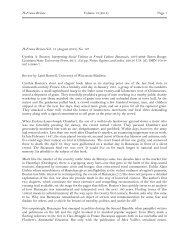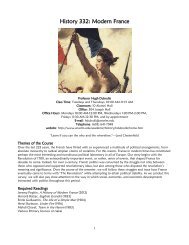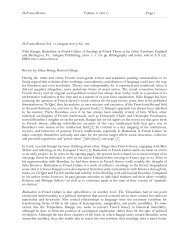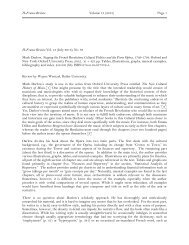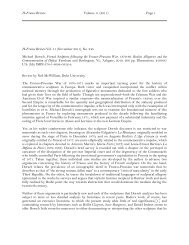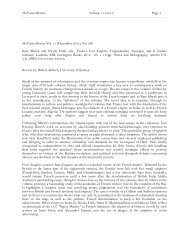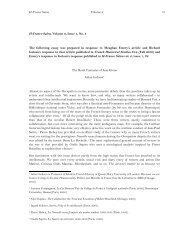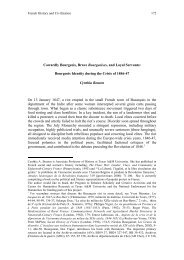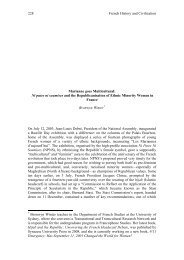Review - H-France
Review - H-France
Review - H-France
Create successful ePaper yourself
Turn your PDF publications into a flip-book with our unique Google optimized e-Paper software.
H-<strong>France</strong> <strong>Review</strong> Volume 11 (2011) Page 4<br />
everybody else does” (p. 119). Viewed in this light, the author’s inclusion of her story seems less<br />
a reinvention of the conduct book than an act of conspicuous cultural imitation.<br />
A word must be said about Greco and Rose’s representation of previous scholarship on this<br />
weighty tome. Even as they acknowledge their reliance on Brereton and Ferrier’s edition and<br />
notes, the translators seem unnecessarily dismissive of their predecessors’ efforts. They assert<br />
that the Brereton/ Ferrier edition “presents an incomplete version of the work” and “feels<br />
disordered and misrepresented [sic]” (p. 4) because it does not include Griselda, Melibee, and<br />
the Chemin de Pauvreté et de richesse. The Oxford edition would have been undeniably enhanced<br />
(and more expensive to produce) had it included the entire compilation. But Greco and Rose<br />
overstate the case when they claim that Brereton and Ferrier did not feel that these texts were<br />
“an essential part” of the work (p. 4). In fact, the editors devote an appendix to a meticulous<br />
comparison of Philippe de Mezières’s and the Ménagier’s versions of Griselda (Brereton and<br />
Ferrier, Menagier, pp. 332-5). Their critical articles, cited in the bibliography, analyze the book’s<br />
didactic sources as integral to the householder’s moral project. Since Brereton and Ferrier<br />
present the text in the order that it appears in the base manuscript (with folios numbers<br />
indicated in parentheses), it is hard to understand the translators’ claim that their work feels<br />
“disordered.” I have found the edition, on the contrary, very well organized for ease of reference<br />
to manuscript A.<br />
Furthermore, Greco and Rose fail to credit their predecessors’ significant contributions in<br />
establishing the critical framework of Le Ménagier de Paris. Claiming that the Ménagier has “in<br />
the past primarily been admired for its antique horticultural and culinary matter” (p. 2), Greco<br />
and Rose imply that they are among the first to read it as “a moral treatise” (p. 2). It may be<br />
true that Pichon (in 1846) and Powell (in 1928) were especially intrigued by the compilation’s<br />
domestic details, which are absent from other notable medieval works on female conduct, such<br />
as the Livre du Chevalier de la Tour Landry or Christine de Pizan’s Livre des trois vertus. But to<br />
suggest that neither Brereton and Ferrier nor Uelstchi appreciated the Ménagier as a book<br />
exhorting proper moral values and social behavior does a grave disservice to their scholarship.<br />
Brereton’s and Ferrier’s extensive scholarly excavations turned up not only detailed information<br />
about gardening, hawking and cooking in medieval <strong>France</strong>, but also a wealth of didactic literary<br />
sources, cited in abundant, meticulous footnotes and discussed at length in their Introduction<br />
(“The Author and His Wife;” “The Author’s Ideal of Marriage;” “Biblical and Literary Sources<br />
for the First Distinction” pp. xxi-xxxix). Indeed, Brereton and Ferrier argue strongly that the<br />
material of the First Distinction (the moral treatise) is just as important as that of the Second<br />
Distinction. They urge readers “….to consider the book as a whole, since for the author the<br />
moral and spiritual teaching and the practical instruction are inseparable and equally important<br />
guides to success in matrimony” (p. xxx). Contemporary critics may disagree with Brereton and<br />
Ferrier’s depiction of the “salutary” view of marriage offered by the Ménagier (p. xxx) and may<br />
object to their portrayal of the husband as a contented, kindly spouse. But readers of any<br />
version of Le Ménagier de Paris owe a huge debt to Brereton and Ferrier for establishing the<br />
literary and cultural milieu in which the putative “good wife” would have received her moral<br />
instruction. Their edition remains the cornerstone for scholarship on this work.<br />
Greco and Rose mention that they have consulted Ueltschi’s translation, but they appear to<br />
have taken scant notice of her fine introduction. Author of a comparative study of medieval<br />
French didactic literature, Ueltschi is well positioned to present Le Ménagier in a sophisticated<br />
critical framework.[13] She is among the first critics to venture the hypothesis that the<br />
husband/wife relationship in the frame is a mere literary device, “une simple simulation au<br />
service d’un projet littéraire” (Ueltschi, p. 9), an insight apparently overlooked by Greco and<br />
Rose who claim that “virtually everyone writing on Le Ménagier de Paris has accepted its author<br />
as who he claims to be” (Greco and Rose, p. 10). Ueltschi’s introduction suggests that the<br />
4



